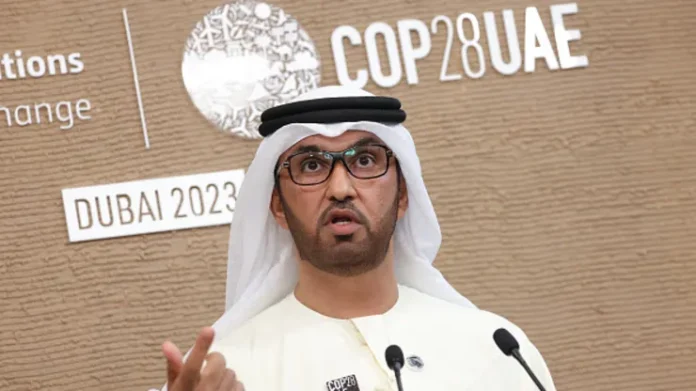The head of the UAE at the COP28 climate talks avoided pushing for a phase-out of fossil fuels, prompting criticism from Western countries who had hoped for a historic turning point, Euractiv reported.
Unlike the earlier draft, which included the landmark option” of phasing out” oil, gas and coal, the new text focuses on “reducing” their production and consumption to achieve zero emissions by 2050.
If the text was designed to secure support from the Saudis, it has disappointed Western leaders as the European Union, the United States, Germany and France call for stronger language.
We consider this an insufficient text. There are elements in the text that are fully unacceptable.
In saying this, Teresa Ribera, the Spanish ecology minister who is part of the EU delegation to COP28, meant there was no explicit reference to phasing out fossil fuels.
The United States, while commending the Emirates for its efforts, called for “substantially strengthened” language on fossil fuels. However, a person familiar with the mindset of the COP28 presidency called the text an “opening gambit” that can be relied upon.
The draft agreement states that countries can take actions including “reducing both consumption and production of fossil fuels, in a simple, orderly and equitable manner to achieve net zero by, before, or around 2050 in keeping with the science.”
As for coal, the dirtiest type of energy, the text mentions restrictions on “new and unabated coal power,” which means promoting potential projects that utilise new carbon capture and storage (CCS) technologies.
The EU’s climate chief, Wopke Hoekstra, stated that there were “a couple of good things” in the draft text, but overall, it was “clearly insufficient and not adequate” to tackle the climate problem and keep global warming below 1.5°C, which was a key goal of the Paris Agreement.
“Scientists are crystal clear about what is needed. And on top of that list is phasing out fossil fuels.”
Hoekstra said “a large majority of countries” demand phasing out fossil fuels and getting rid of coal, including small islands as well as countries in Europe, North America and Asia.
It’s up to us to make sure these voices are being heard and that this is solved in the next day, or the next days, or however long it’s going to take.
However, Hoekstra recognised that fossil fuel use cannot be phased out overnight and that some technologies, such as CCS, would be required for the sectors of the economy most struggling to reduce emissions.
“We have no alternative than to continue the conversation and ensure that we arrive at keeping 1.5 alive.”
